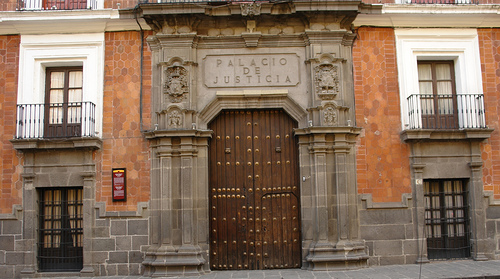« March 15, 2009 - March 21, 2009 | Main | March 29, 2009 - April 04, 2009 »
March 28, 2009
Saturday's Charon QC: Meet the Prime Minister
Charon After Dark: An interview with Gordon Brown? "Few people get a chance to interview an unelected serving Prime Minister and I am no different." And why not, sir? The real one we urge you to do may even be as good as this.

Posted by JD Hull at 11:56 PM | Comments (1)
March 27, 2009

Posted by Holden Oliver (Kitzbühel Desk) at 11:21 PM | Comments (0)
"Reinventing" the Latin American Law Firm--Part II of II
By Fernando E. Rivadeneyra, Puebla, Mexico
Editor's Note: This is Part II of an article by our friend and colleague Fernando Rivadeneyra, a partner at Rivadeneyra, Treviño & de Campo, a corporate law firm with a global reach based in Puebla, Mexico, located about 100 kilometers southeast of Mexico City. Part I began on March 23 and details specific changes Rivadeneyra and his partners made to their respected Mexican law firm.
Part II: How Do We Implement These Fundamental Changes in Mexico?
Since 2006, our firm has employed two external consultants. One consultant has been instrumental in giving each lawyer--or group of lawyers--in the firm a large hand to play in the growth of one specific law practice area. Our other consultant has developed a concrete career development program and training program, which sets achievable goals for each lawyer's career progression.
Next, in early 2008, our firm hired an experienced marketer in-house to develop a Client Relations Department within our firm. The goal of the new Department is two-fold:
1. To maintain an excellent working relationship with our existing clients and to encourage their loyalty to our firm, and
2. To promote our firm's expertise to a wide audience of potential clients, both in Mexico and abroad.
In order for other Latin America firms to improve their management systems, they must also invest in outside help, make some internal hires, and make adjustments similar to those made by our firm. In addition, firms must be aware of management trends at other leading firms in the international legal community and, when appropriate, emulate and borrow from them.
Problems inherent in transforming an established work culture
The principal obstacle we have encountered has been the lawyers’ natural resistance to change; at times, they are opposed to new elements being added to their job descriptions. However, if other firms in the region plan to reorganize themselves in a similar way, a heightened level of "buy-in" and support will be needed from everyone: senior partners, department leaders, and all lawyers and staff.
The results of re-organization
Latin American law firms are at the beginning of a long-term project in terms of introducing new modes of management; the results won’t always be easy to measure.
Within Rivadeneyra, Treviño & de Campo, we have already realized notable short-term gains, such as a greater cooperation between lawyers and a more relaxed working environment. We have also achieved a broader presence and name recognition--and a far more extensive (and more international) client list.
We have also learned a great deal from observing how other successful firms are organizing themselves, and are open to discussing any of the issues discussed above in more depth with other firms both in, and outside of, Mexico and Latin America.
About the Author: Fernando Rivadeneyra is a Founding Partner at Rivadeneyra, Treviño & de Campo. He specializes in: Mergers & Acquisitions, Private International Law, Corporate Law and Foreign Investments. He is a member of the International Bar Association, the Mexican-American Law Institute, and Export Support Group, and is Vice-President of the United States-Mexico Chamber of Commerce – Puebla Chapter.
Rivadeneyra has written articles for several publications, and frequently speaks before legal conferences. This article was written in collaboration with Jodie Paula Cohen, who is in charge of Client Relations at Rivadeneyra, Treviño & de Campo. For further information, please contact: frivadeneyra@rtydc.com or jcohen@rtydc.com or visit: www.rtydc.com.

Posted by JD Hull at 10:00 PM | Comments (2)
March 25, 2009
Does this mean we're not invited to Eastern Europe's 67th annual Chronic Bad Mood Festival held in Prague this summer?
Deposed Czech leader kicks out the jams; U.S. on fiscal Highway to Hell. Finally, at least, we meet a European--and an EU leader to boot--who speaks American English. AP via MSNBC. Usually, it's hard to get anyone but the French to tell you what they really think:
STRASBOURG, France--The head of the European Union slammed President Barack Obama’s plan to spend nearly $2 trillion to push the U.S. economy out of recession as “the road to hell” that EU governments must avoid.
The blunt comments by Czech Prime Minister Mirek Topolanek to the European Parliament on Wednesday highlighted simmering European differences with Washington ahead of a key summit next week on fixing the world economy.
It was the strongest pushback yet from a European leader as the 27-nation bloc bristles from U.S. criticism that it is not spending enough to stimulate demand. [more]
Hey Mirek, how's that Czech Republic economy going for you?
Posted by Holden Oliver (Kitzbühel Desk) at 12:50 AM | Comments (0)
March 24, 2009
"Reinventing" the Latin American Law Firm--Part I of II
By Fernando E. Rivadeneyra, Puebla, Mexico
Editor's Note: Fernando Rivadeneyra is much more than a talented and highly-regarded business lawyer who works literally all over the world. He is also a colleague and a close friend. My partner Julie McGuire and I have met with Fernando and other members of his firm, Rivadeneyra, Treviño & de Campo, countless times over the past ten years in Europe, Latin America, and the United States. We have worked together on client projects. Like our firm, Rivadeneyra, Treviño is an active member of the International Business Law Consortium, a working alliance of law and accounting firms based in Salzburg, Austria.
A founding partner of Rivadeneyra, Treviño, Fernando works in mergers and acquisitions, corporate structuring, foreign investments, and private international law. He is a member of the International Bar Association, the Mexican-American Law Institute, and its Export Support Group, and is Vice-President of the United States-Mexico Chamber of Commerce--Puebla Chapter.
His article--on fundamental changes in Latin American law firms--will be run in two parts. Part I, below, discusses changes Puebla-based Rivadeneyra, Treviño & de Campo has made in the last three years. Part II, which WAC? will run later this week, focuses on implementing those changes. Jodie Paula Cohen, head of Client Relations at Rivadeneyra, Treviño & de Campo assisted in the preparation of this article.

"Reinventing" the Latin American Law Firm
Three years ago, the founding partners of my firm, Rivadeneyra, Treviño & de Campo, based in Puebla, Mexico, took a hard look at the fast-changing global legal terrain. We decided to radically change the structure and management of our firm. The objective: to better position ourselves within the increasingly globalized legal markets. That goal had already been admirably achieved by many overseas law firms, and the in-house legal departments worldwide.
However, reorganizing law firms in Latin America poses different challenges, and requires fundamental and difficult changes in the way firms are organized in this region. Latin American law firms have certain traditions--including some very old ones--which we needed to address. This article, hopefully, will be useful to other law firms who assist clients in Mexico, and in-house legal counsel of companies that operate here. It will highlight the advances which are being made in the region, the obstacles, and what can be expected in the future.
Turning lawyers into pro-active business people
In Latin America, lawyers historically have not been active in marketing and selling their services. Our firm’s lawyers are now encouraged--indeed expected--to support our focus on both national in Mexico and overseas expansion. By explicitly linking their compensation to the number and quality of new clients they bring to the firm, and by training them in marketing and sales techniques, we hope to overturn a long-embraced tradition of "not selling"--and make our lawyers highly "engaged" and pro-active business people.
When recruiting new lawyers and paralegals, we search for specific talents, cultural attributes and experience which can help make the firm a true player in the global marketplace. For example, Latin American firms are currently experiencing a shortage of bilingual lawyers with capabilities for cross-border deals. Our firm has actively recruited both lawyers and staff with significant multilingual skills.
Training and development to become global players
So we began a "training course" for lawyers at the start of 2009. Aiming to bring our lawyers’ skills and professional attitudes in line with those of the international legal community, the course includes:
--Etiquette in Business Negotiations: Cross-border cultural skills will enhance our lawyers’ sensibilities to cultures in other parts of the world--and facilitate business relations with overseas clients and firms.
--Cultural Diversity: This is a relatively new concept for Latin American law firms, but one which we expect will be of vital importance going forward.
--English Language Fluency: As suggested above, fluency in English will continue to be a priority for Latin American law firms--to increase their access to overseas clients, and enable them to participate in global markets.
We are also working with our employees with three overall professional development goals in mind.
First, we want each employee to become aware of and focus on his or her unique role within the firm. Second, we encourage our employees to view their work product and delivery of services critically. And third, we expect our employees to continuously improve not only their substantive legal skills but also their client service skills.
This "team" approach is relatively new to many Latin American firms--and we believe it will both encourage positive attitudes amongst employees, and significantly enhance their day-to-day dealings with clients.
A new concept in employee salaries
The salaries which we pay to our employees are an important acknowledgment of their efforts to help the firm achieve its business objectives; and we ‘pay’ this salary in three ways:
1. The ‘economic salary’ is, of course, money; it fulfills our employees’ physical needs--for food, a home, clothes, etc.
2. The ‘psychological salary’ fulfills our employees’ desire for recognition and appreciation. Competition for excellent lawyers is as fierce in Latin America as anywhere in the world. One simple way we promote "good feeling" at our firm about the lawyers’ professional life--and encourage loyalty to the firm as well--is to regularly highlight and praise their successes and useful contributions.
3. The 'spiritual salary’ we 'pay' gives employees a sense that their work is meaningful and worthwhile. Pro bono work contributes to this, as will similar schemes which we plan to implement this year.
Part II, later this week: "How Do We Implement These Fundamental Changes in Mexico?"

Posted by JD Hull at 11:59 PM | Comments (3)